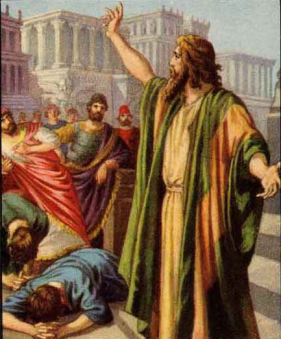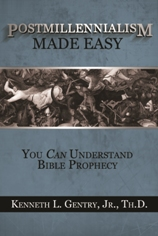INTRODUCING ISAIAH (2)
PMW 2023-095 by Kenneth L. Gentry, Jr.
In this posting, I am continuing a brief historical and literary introduction to the Book of Isaiah. Such knowledge is helpful for better interpreting the text. We move now to consider:
PURPOSE
Isaiah ministered during a dangerous, tumultuous, and critical time. Judah and Israel have major world powers Egypt (Isa. 19), Assyria (Isa. 36), and Babylon (Isa. 13) either on the scene or looming in the near future. This problem is compounded by Israel’s unfaithfulness (e.g., 1:10–11; 6:9; 42:14–25; 43:22–28; 48:1–2). Therefore, some of Isaiah’s leading purposes include:
Isaiah calls Judah and Israel to repentance. Isaiah opens with a call to heaven and earth to serve as witnesses to God’s legal indictment against Judah and Israel (1:2–9). It was important for Isaiah to call the people to repentance by teaching salvation by grace (e.g., Isa. 1:18–20; 40:2; 43:1–7, 25; 44:28; 51:2; 55:1–13; 63:7–9).
Isaiah warns Judah and Israel not to depend upon men. Israel needed to depend upon God and not make alliances with pagan nations (14:28ff; 30:1ff; 31:1ff). Isaiah warns that pagan nations will be brought down by God, even mighty Assyria (10:5–19) and Babylon (Isa. 46–47).
Isaiah answers questions that arise due to Judah and Israel’s woes. Isaiah explains God’s sovereignty in allowing pagan nations to dominate faithless Judah and Israel (10:5–19; 46:1–47:15). He notes that Judah and Israel’s judgments come in various forms (24:4–5), including disease (1:5–8) and military defeat (5:26–30). Yet they are from God’s hand (43:27–28). He also speaks of the future of the Davidic monarchy (9:6–7; 22:22). He explains that God’s judgment does not imply God’ rejection of his people (10:20–22; 35:10; 41:9).
BEFORE JERUSALEM FELL
Doctoral dissertation defending a pre-AD 70 date for Revelation’s writing (459 pp; paperback). Thoroughly covers internal evidence from Revelation, external evidence from history, and objections to the early date by scholars.
For more study materials: https://www.kennethgentry.com/
Isaiah promises God’s mercy to Judah and Israel — as well as the nations of the world. The book of Isaiah emphasizes a time of universal peace and blessing both in its beginning (2:1–4) and its conclusion (65:17–25). Isaiah’s very name suggests a positive purpose in his prophecies, for “Isaiah” means “Yahweh is salvation.” And the same is true of the name Isaiah chooses for his first son, Shear-Jashub (7:3), which means “a remnant shall return.” Therefore, the prophet repeatedly emphasizes God’s forgiveness (1:18–19; 12:1; 30:18–19; 33:24; 38:17; 40:1–2; 59:20).
IMPORTANCE
Isaiah has been widely used. The book of Isaiah has long been important to God’s people. We see this in several ways. Among the Jews at Qumran, the second most cited book in the Dead Sea Scrolls is Isaiah, exceeded only by Deuteronomy. Not only do we find among these Scrolls a complete, well–preserved Isaiah scroll, but twenty partially-preserved copies. The New Testament alludes to Isaiah 411 times, directly quoting it over fifty times (e.g., Matt. 13:14–15; Luke 8:10; John 12:40; Acts 28:26–27; Rom. 9:29; Heb. 2:13; 1 Pet. 2:9).
The next three observations explain why Isaiah was so popular to New Testament writers.
Isaiah emphasizes important doctrines. Isaiah presents us with an exalted view of God. It especially emphasizes his sovereignty (6:1ff; 24:1–3; 37:15–20; 43:8–11) and his holiness (1:4; 5:16; 30:9–16; 37:23; 43:8–11). And in light of these glorious doctrines, it especially condemns human pride (2:11–18; 14:12–15; 37:23–25; 66:1–3).
Isaiah is strongly eschatological. With its strong emphasize on God’s sovereignty (see above), it repeatedly speaks of the future conversion of the Gentile nations (Isa. 2:2–4; 11:6–10; 19:16–25; 42:1–12; 49:5–6; 60:1–3).
Isaiah is strongly Messianic. Only Psalms has more references to Christ than does Isaiah. Of its many Messianic passages, we may include: 7:10–15; 9:1–7; 8:23–9:6; 11:1–16; 14:28–32; 24:21–23; 32:1–8; 33:17–24; 42:1–4; 49:1–6; 50:4–9; 52:13–53:12; 59:21; 61:1–3, 10–62:7; 63:1–6.

Dispensational Distortions
Three Lectures by Kenneth Gentry. Reformed introduction to classic dispensationalism, with analysis of leading flaws regarding the Church, kingdom, redemptive history, and Christ. Helpful for demonstrating errors to dispensationalists.
See more study materials at: www.KennethGentry.com
STRUCTURE
Isaiah is difficult to outline because of its great length, its non-chronological presentation, and its anthological nature (see above). Its non-chronological nature is clearly evident in that it waits for five chapters before it presents Isaiah’s call and commission (Isa. 6:1–9), which is foundational to his prophecies. We would generally expect to see this at the front of the book, as is the case with Jeremiah (Jer. 1:1–4) — though Amos gives his call later in his own prophecy (Amos 7:14–15).
Nevertheless, we may summarize its basic thematic structure in the following way:
I. GOD’S JUDGMENT (1–39)
A. God’s indictment of Judah (1–6)
B. Prophecies of deliverance (7–12)
C. Judgments on the Gentile nations (13–23)
D. Punishment and Blessing (24–27)
E. Woes and Warnings (28–33)
F. Punishment and Blessing (34–35)
G. Historical Interlude (36–39)
II. ISRAEL’S RESTORATION (40–66)
A. Comfort and Deliverance Promised (40–48)
B. Salvation from God’s Servant (49–57)
C. Salvation Completed (58–66)
Click on the following images for more information on these studies:



Kenneth L. Gentry Jr.'s Blog
- Kenneth L. Gentry Jr.'s profile
- 85 followers



